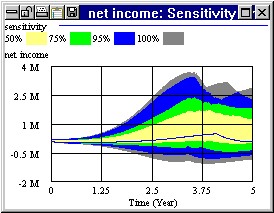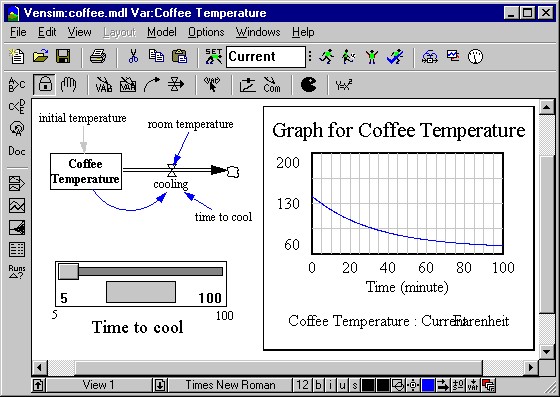Advanced Course in System Dynamics
Online Course with Vensim ®
 WHY I NEED THIS COURSE WHY I NEED THIS COURSE
This course allows the student to acquire, in a time-efficient
and uncomplicated manner, knowledge in the formation and
construction of dynamic models using Vensim.
Many times, the models are performed with minimal current
data and very few historical data. The simulation models that
the student will design in this course accommodate these
analyses, with the construction of realistic hypotheses and
elaborate behavior models.
That's done with the help of software that facilitates the
construction of the models as well as performing model
simulations. (Software is available for Windows and Mac
computers.)
At the end of the course, the student is able to:
1.
Describe the components of a complex system.
2. Diagnose
the natural evolution of the system under analysis.
3.
Create a model of the system and present it using the simulation
software.
4. Carry out simulations with the model, in
order to predict the behavior of the system."

 ORGANIZATION ORGANIZATION
ATC-Innova has a solid reputation in model simulation research, and is a dynamic company in constant evolution. As such, the company offers internet-based courses to serve English-speaking students who are interested in taking courses.
Courses via the Internet are an excellent opportunity to access postgraduate education, as the student may access the course on the student's own time, at his own pace, and minimizing the loss of work hours.
Additionally, it has been noted that this course, in its internet mode, gives excellent results because the student is very closely monitored in his learning process by the course instructor.
The student receives the documentation of the course and the simulation software Vensim PLE at home. Throughout his progress in the course, he receives by e-mail instruction with study cases and exercises to complete. The student then submits the models he creates to the instructor by e-mail. The instructor is available to the student in this capacity for any help the student needs during his studies.
Because of this very close relationship between the instructor and the student his evaluation is continuously monitored through the completion of the different exercises and study cases.
 SYLLABUS SYLLABUS
First, the basic structures of the systems and more common dynamics are presented. Next, the phases in the construction of a model are studied. Last, using study cases, the student is taught how to model with the software and simulate different alternatives.
PHASE I. CONCEPTS
SYSTEM DYNAMICS
Causal diagrams.
Stable, unstable and oscillant systems.
Medium term dynamics.
CONSTRUCTION OF A MODEL
Flow Diagrams.
Phases in the construction of a model.
Computer simulations.
PHASE II. BASIC EXERCISES
INTRODUCTION
Using the software.
SIMPLE SYSTEM
Foreseen behavior and behavior in the model.
PRODUCTION AND INVENTORY
From the text description to the model.
Using Tables in non-linear relations.
Using Delays in the models.
PROJECT DYNAMICS
Building a model in phases.
The measurement units help us.
SHORT TERM vs. LONG TERM POLICIES
Studies in soft defined environments. To extract the data.
Importance of the horizon of the simulation.
Simulating different management styles.
COMMODITY CYCLE
To integrate several submodels in a bigger one.
The cause of the oscillations.
Explanation of the results.
PHASE III. ADVANCED EXERCISES
THE AGING CHAINS
DRAWING COMPLEX DIAGRAMS
USING QUALITATIVE VARIABLES
IMPORT DATA AND EXPORT RESULTS
BUILDING SIMULATION GAMES
CREATE INTERACTIVE MODELS
USING INPUT OUTPUT INTERFACE
MONTE CARLO SENSITIVITY TESTIG

 TEACHER TEACHER
 |
Juan Martin Garcia , Ph. D. Industrial Engineer, diploma in the Sloan School of Management of the Massachusetts Institute of Technology ( MIT ). He has given classes of building models during the last 20 years in several universities and is a recognized consultant in this field, this allows him to offer a double vision: theoretical and practical.
|
 SOFTWARE SOFTWARE
The student receives a license of Vensim PLE PLUS without any additional cost.
 COST COST
The total cost of the course is 300 euros
 DURATION DURATION
Eight weeks from the start date. Some pauses are possible if the student justifies it for professional reasons.
 REQUIRED KNOWLEDGE REQUIRED KNOWLEDGE
This course is intended for undergraduate and graduate students with or without professional experience.
Only basic computer skills are needed. No statistical or specific mathematical education is required.
 APPLICATIONS APPLICATIONS
The content of this course can be applied in many areas. In the business world, these topics are mainly used to address issues related to Strategic Planning, Business Planning, Leadership Development, Strategic Marketing and Sales, Organization Redesign, Process Improvement, Implementation of operational plans. In general to build and sustain high performance over the long term, and ensure successful implementation of changes.
In the academic world, these topics may be used to develop Final Projects or Doctorate, theses on diverse subjects.
 CERTIFICATE CERTIFICATE
The certificate is issued by ATC Innova, Official Distributor of Vensim. Students need to complete the 50% of the exercises to obtain the certificate.

 REGISTRATION REGISTRATION
1. Please download the registration form and fill in your personal data,

2.Pay with credit card here,
3. Email the registration form with a copy an official document of identity.

Home: 




|